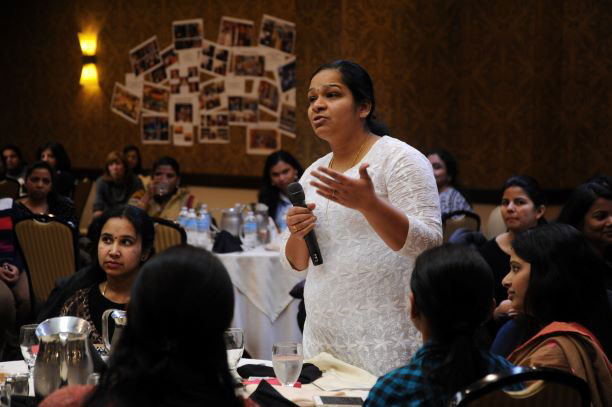It’s 2020 yet women are still being underrepresented in leadership roles, but it’s not that they aren’t doing their part. According to Lean In and McKinsey & Company, women are staying at companies longer than men and have been negotiating their salaries and asking for promotions at the same rate as men since 2015.
Yet there is still a large discrepancy when it comes to women and men in manager positions. In the same study, they found that for every 100 men that was promoted and hired to manager, only 72 women were promoted. It gets worse for women of color- for every 100 men promoted to manager, only 57 Latinas and 64 Black women were promoted. This leads to men holding 62% of manager-level positions, while women hold just 38%.
So if more women are in the workforce, staying at companies longer than men, and asking for raises and promotions, why are we not seeing more women in manager positions?
Gender biases may have something to do with it.What is Gender Bias?Gender bias is the tendency to favor one gender over the other. Today, especially in business settings, gender bias refers to the unfair treatment of women and the ways in which white, heterosexual men are favored, giving them more advantages in their careers.
Oftentimes gender bias is completely unconscious- we revert to stereotypes to explain the world around us without even realizing what we are doing. For example, during the hiring process, both men and women might be more inclined to hire someone with a man’s name rather than a woman’s name, even if their qualifications are similar.
There are a few different types of gender biases. Here are a few common types of gender biases and how they play out in business settings:
 Likability bias
Likability bias
These revolve around the expectations we hold for how women and men are supposed to behave. There is a cultural perception that men are assertive and natural leaders and women are kinder and gentler which is just not accurate.
To visualize how this could play out at work, imagine a man in a business meeting. He is leading the conversation, voicing his opinions, and speaking a lot, all qualities that could get him noticed for being a leader.
But if a woman were to do the same thing, she might be called “bossy” “rude” and be told she was “speaking too loudly” because we expect women to be calmer and take the back seat when it comes to leading.We asked our Senior Marketing Manager, Alyson Knox-Meade, what her advice for women in the workplace is, and she said:
You don’t need to compete with other women in the workplace. It’s much better now, but in the past, I’ve had more horrible female bosses than I care to count all because they felt threatened and were more inclined to back stab you. We should all help each other. My other piece of advice is not to be afraid to speak up and be assertive.
It is not just men who hold these biases. It’s especially important for women to recognize when these biases are affecting how they are treating other women. In the past, there was much more competition for women in business because there were drastically fewer women working.
But now, with more women working, we need to focus on making sure this doesn’t change. We should be helping our female colleagues out as much as possible, opening up new opportunities for women to come together and grow in their careers. We are in the position to help others get where they want to be and work towards creating an empowered and diverse environment.
Maternity Bias
These are cultural assumptions about women who are mothers. If a woman at a company is a Mother, pregnant, or there is any possibility she will become a Mother soon, she is regarded as less competent and less committed to her career.
For example, if a company is deciding on who is ready for a promotion, they might overlook a woman who has children even though she is clearly qualified because they think she isn’t fully committed to her career, deterring her from getting an opportunity to advance.
Or, if a woman takes parental leave, there is a higher chance that she will feel negative consequences of doing so, and feel like she has to prove herself even more. Referring back to the study from earlier, they found that “20% of women who’ve taken a leave say it negatively impacted their career, compared to 10% of men”.
 Performance Bias
Performance Bias
These are assumptions surrounding women’s and men’s abilities, specifically when it comes to their jobs. Society has created a tendency to underestimate women’s performance and overestimate men’s performance.
One example of this in the workplace is if a woman introduces herself in a business conversation as COO of a company and the person is shocked because they assume she was much more junior.Val Skrivner, the Front-End Engineering Manager at Affirma, made a good point about women’s abilities compared to men:
[I am inspired by] all of the female athletes currently taking the opportunities they’re being given at men’s professional all star games to show their skills and talent, and prove that they’re worth watching just as much as the men are.
She is right. Women are just as powerful as men and deserve the chance to be seen that way. And while there is so much work being done to change these misconceptions about what women are and are not capable of achieving, we need to do more and speak up when we see these types of attitudes arising.
Affinity Bias
This is based on the fact that people tend to be partial to those that look and act like themselves (appearance, beliefs, backgrounds, etc.,) and avoid those who they see are different than themselves.
For example, if a man decides to become a mentor and chooses someone because they remind him of himself. This is common and very likely to be an unconscious decision. However, mentoring programs within companies are fantastic ways for people to get extra support and guidance to grow into leadership roles. Since a higher number of men are already at the top and they continue to mentor those who are just like themselves, there isn’t a lot of room for women and people of color to advance.
Attribution Bias
This is closely linked to performance bias and happens when people see women as less competent than men. They give them less credit for their accomplishments and are more likely to blame them for mistakes.
A common example of this is when a woman suggests an idea or makes comment in a group setting and it gets ignored, but five minutes later a man says the same thing and he gets rewarded for it.
Each of these biases plays a role in the way women are viewed within a company and the rate at which women are being promoted. It should also be noted that intersectionality plays a large role as well. These biases impact women of color, LGTBQ women, and women with disabilities at higher rates than white women without disabilities.
We asked Erin Dobie, Director of EMEA at Affirma, who she admires most and she replied:
Melinda Gates. She is an advocate for gender equality with a focus on global health, education, and basic standard of living. She is dedicated to her work and has found a way to get some of the most talented and intelligent people in the world focused on the betterment of mankind. She has the courage to speak up and uses her position of power to make the world a better place. I love listening to how she is working to bridge technology in her mission and the optimism that she possesses in the face of some extremely lofty goals. I find her to be such an inspiration.
It’s a relief to know that people like Melinda Gates are working tirelessly for gender equality. Less women, and diversity in general, can cause several problems in business. When there is no diversity at the top, employees feel like there is no room for them to grow at the company causing employee satisfaction and retention rates to go down.How Companies Can End Gender Biases
Establish Clear Criteria For Hiring, Recruiting, and Reviews
When it comes to hiring, make sure your team is trained on the above biases and how they can become prevalent when trying to find the right candidates. Also make sure there is significant training among managers when it comes time to do reviews, calling out common ways women are held to different standards and reviewing how these might affect their reviews.
Developing clear and measurable criteria for reviewing and hiring employees gives employees specific feedback and holds everyone to the same standard.
 Company-Wide Gender Bias Training
Company-Wide Gender Bias Training
When you educate all employees about gender bias, they will be able to recognize these unconscious biases that they might be exhibiting. It also introduces them to ways in which they can call out other people’s biases making it known that your company does not stand for these types of behaviors and leads to a more welcoming company culture.
Diversify Mentorship Programs
Implement a mentorship program that focuses on bringing a more diverse group of people together. To do this, you should be strategic with who gets paired with who, avoiding the chance that mentors will choose people who are just like them. It also allows mentors and mentees to learn from each other’s differences and encourages a culture of inclusivity and learning.
Ensure Your Benefits Will Meet The Needs Of All Employees
Gather a diverse group of employees to get suggestions for benefits that will work for everyone in our company. You can also send out anonymous surveys and get suggestions that way.
For example, if you have a younger employee base, they might place a higher value on parental leave. It’s important to check in with everyone at your company to make sure your policies are diverse and benefits everyone.
Everyone has unconscious biases that have been ingrained in them because of the way our society has developed. However, everyone has the power to recognize these biases and work to limit them. Stand up for your women co-workers, advocate for more diversity across your organization, attend unconscious biases training sessions, and educate yourself about ways that sexism and prejudices can play out in business and the world around us. These are all ways we can help to create a more inclusive environment and a more equal world.
At Affirma we are lucky to have some fantastic women in leadership and we are so lucky to celebrate women all around the world!




